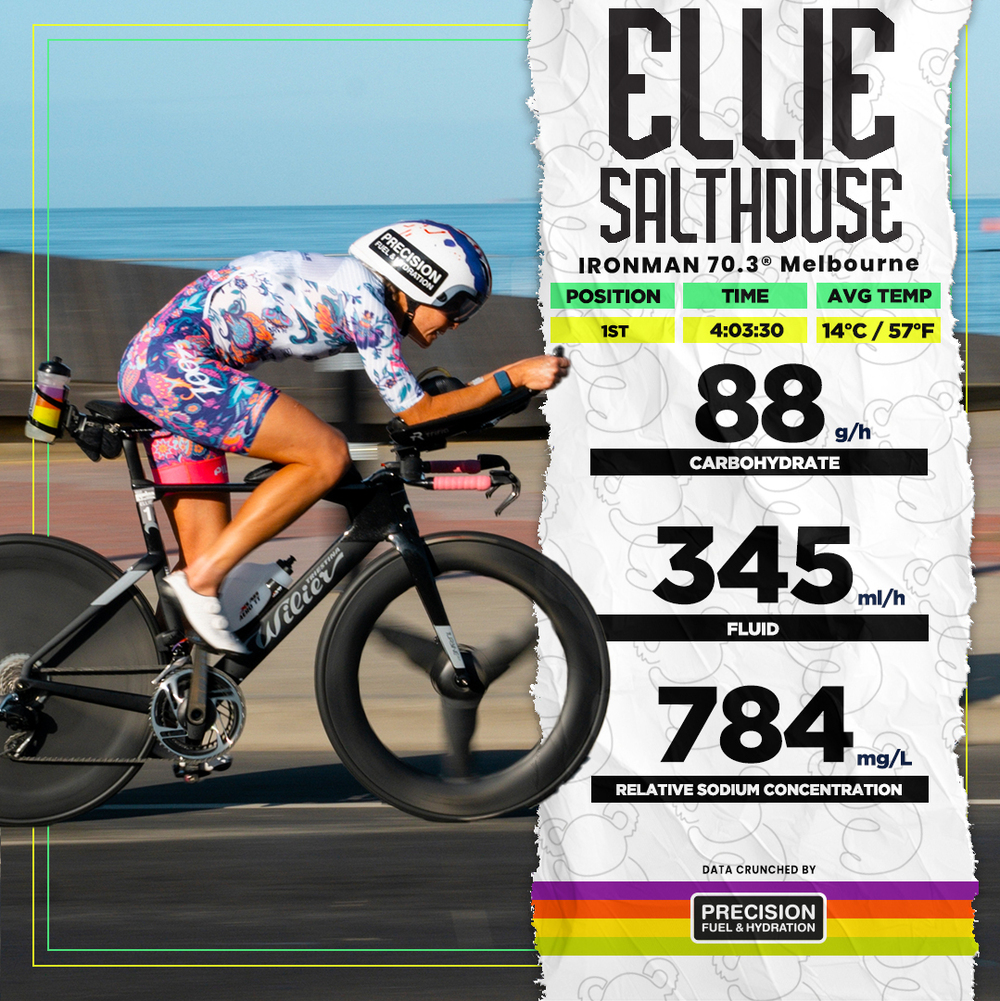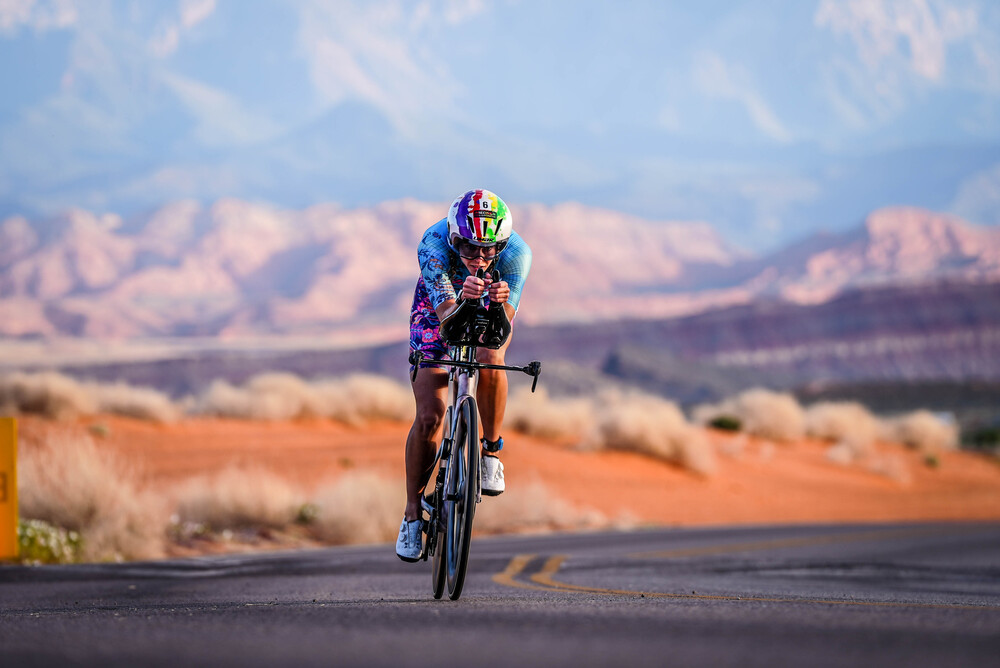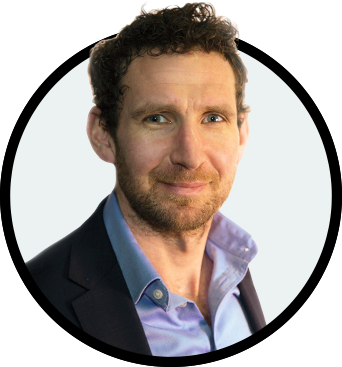Pro triathlete Ellie Salthouse was 11 years old when she first took up swim-bike-run, and from turning professional as a teenager to becoming a master of the middle distance, it has been two decades of dedication to the sport.
The Australian is also a prolific winner. Now 31, her record of consistent success can rival any of her peers. Barring the Covid-hit 2020, she has won a professional race every year since 2016. It's now 25 victories and counting, with Ellie’s big goal for 2024 being the IRONMAN 70.3® World Championship in Taupo, New Zealand.
Having relocated back home to Brisbane, she’s hoping a distraction-free build-up will give her the edge required to land a first world championship medal. But even if it doesn’t happen this year, it’s a safe bet that more wins are on the horizon.
A shining talent from a young age, we wanted to know what continues to sustain Ellie’s drive for success in the sport...

1. Maintaining coaching stimulus
Ellie describes her coaching journey as running in 10-year cycles. While it’s a slightly tongue-in-cheek comment, it also speaks to the human need for the duality of consistency and change.
“It feels like after that 10-year mark things start to get stale,” she explains. “The training stimulus becomes repetitive, which means I need to move on. Change is valuable, but having a constant is valuable as well because you need consistency within the training. It’s also up to the coach to keep things fresh. Everything is evolving in the sport, so it’s up to them to keep evolving as well.”
Brisbane-local Warwick Dalziel was Ellie’s first coach and over 10 years developed her into a fully-fledged short course (then ITU, now World Triathlon) athlete. “Those were the formative years, requiring discipline and structure,” Ellie says. “It’s not easy. From 11-21 can be chaotic years where you’re basically figuring everything out.”
Ellie says one of the biggest boons of that time was the squad mentality. “Every session was done with between five and 10 other athletes, and I had a friendship with everybody. You need a balance – especially at that age – with friends you can lean on in and out of training.”
The switch to Siri Lindley’s squad in the US in 2014 continued a strength-in-numbers mentality, as Ellie joined a team rich in experience with multiple world titles. Training alongside a celebrated squad that included Mirinda Carfrae, Mary Beth Ellis and Jodie Swallow (now Cunnama), it coupled mentorship with learning as she eventually transitioned to the longer distance.
Lindley is renowned for instilling self-belief in her athletes, largely eschewing technology to teach them to tune into their bodies. Over the years that followed, Ellie was rarely off the podium.
Ellie decided it was time to switch things up again earlier this year. Triathlon had continued to evolve, equipment was becoming faster, coaching more data-driven, and Ellie felt she was missing some of the feedback that could help gain another edge, particularly on the bike.
Peter Richards, a cycling coach from Brisbane who guides a number of professional riders, came onboard. Shaun Crow, the director of swimming at Nudgee College, who had coincidentally been Ellie’s high school swim coach, took charge of the swim, and Ellie’s partner Zac Collins covers the run coaching and oversees the overall load management to make sure she’s not overdoing it.
2. Knowing when to move on
Coaching relationships don’t always end well, because if things were going well, they wouldn’t have ended. This was the situation with Ellie and Dalziel, which led to her quitting the sport for six months in 2013.
“I was at a crossroads of not performing how I wanted to and spending a lot of time overseas in a hotel room by myself,” she says. Upset and lonely, Ellie walked away from triathlon before realising she missed the structure of the training and especially the racing.
“I came home from Europe in a bad place and not knowing what I wanted to do with my life. I got a regular job and was studying for a personal training certificate, but it wasn’t fulfilling that competitive side,” she adds. “That’s when I reached out to Siri via her best friend, Loretta Harrop, who was the silver medallist in the Athens Olympics.”
Fortuitously, Lindley was holding a training camp on Gold Coast at the time and it was the introduction that would lead to the next decade of Ellie’s career. “She was like: ‘Alright, you gotta move to Boulder next month, and in the meantime, you’ll move down here and start training with me!’ I found a place to live and rent on Gold Coast, moved down for a couple of months, then packed my stuff and moved to Colorado.”
It was the beginning of 2014, Ellie hadn’t been to the US before, and was the only short course athlete among a dazzling array of IRONMAN® talent. “I was so far out of my depth,” she reflects. “This little ITU athlete coming off ‘retirement’, who waltzed in with no idea what was going on. It was a bit of a test for my ego.”
Salthouse returned to race ITU continental cups. The ability to earn top-10s and the occasional podium result hadn’t diminished but there was an obvious problem. “My training was going great, but I wasn’t making any money and was totally reliant on my parents. I was 23 and needed to start making some money or do something different.
"That’s when Siri suggested I try a middle-distance race.”
There was initial reluctance, but Lindley’s persistence paid off. The pair agreed to try a probationary year focused on longer distance training and racing, and a win in Challenge Melbourne at the start of 2016 was followed by three more before the year was out. The pattern was set.
3. Learning independence
As every triathlete knows, getting on top of the logistics for an event can be half the challenge. Mistakes, such as forgetting essential items of kit, often compound the stresses of an already fraught situation. For a young triathlete leaving Queensland for the first time for the ITU circuit, Ellie needed to learn these lessons fast.
“Every young pro athlete starts the same way,” she says. “The races are all over the world, and I was globetrotting by the age of 18.” Ellie had turned professional after qualifying for the youth Olympic Games in 2010, and was “thrown into the deep end”.
As part of travelling internationally with AusTriathlon (formerly Triathlon Australia), Ellie was mandated to take out a pro licence for insurance purposes. “From then on I was only allowed to race pro and open division races,” she explains. “The entire age-group part I grew up racing was gone. I finished school in November 2010 and by April 2011, I was on an airplane heading to Spain for six months.”
The experience was invaluable, if lonely at times. “It wasn’t super glamorous and a lot of my race trips away from my training camp were just on my own, catching buses, planes, taxis, whatever I could get.
“But it taught me how to be independent and forced me to be organised and develop skills that most regular 18-year-olds probably don’t have yet. I am really grateful for that part of my life for sure.”
4. Parental support
There’s a reality about the formative years of professional triathlon that without a loyal team backing your efforts, you're going to struggle to succeed. It’s not all material support, but the hard fact is that you need some finance to get along.
“I’m privileged that my parents put me into the sport, and I was able to go to Europe with the squad and race ITU around the world,” Ellie says. “A lot of athletes can’t get finances or resources and consequently don’t stick at the sport.”
Helping fund those early years eventually paid off. The first middle distance victories in 2016 in Melbourne, Boulder, Miami and Shepperton, alongside further podiums in Coeur d'Alene and Cozumel, brought profile and prize-money: “Finally, I’d earned enough money to be financially independent.”
5. Location, location, location
The beauty of triathlon is that it can take you to some of the most picturesque spots on the planet. When it’s your profession, it extends to the training environment too, and whether it’s Colorado, Utah or Queensland, it’s been a chance for Ellie to embrace the great outdoors.
“Location is super important, especially as I’m getting older,” she says. “I need to be comfortable where I am and feel like it's somewhat home, even when it’s not.”
For the past couple of years before heading back to Brisbane, it was St George in Utah – the venue for the 2021 IRONMAN® World Championship (held in May 2022) and host for numerous other high profile races in recent years.
“It’s not the best place for training but I have a great support network there,” she says. “Everyone is so lovely and it’s a small town we love being a part of.” It’s also surrounded by stunning national parks such as Zion and Bryce Canyon.
Another draw of switching to the longer distance was being able to pick her own races rather than being constrained by the federation’s calendar of World Triathlon events. That opportunity widened when she didn’t get a T100 contract for 2024, and, because she doesn’t race full distance, isn’t a contender for the IRONMAN® Pro Series either.
“I can go to 70.3 races that have great prize money and exposure, and then pick some other favourite races that I actually want to do, such as Geelong,” she says. Southwest of Melbourne, Ellie has twice won IRONMAN 70.3® Geelong (2021 and 2024) as well as finishing second in 2019. “Mont Tremblant had also been on the bucket list for years and I finally got to go there.”
So, the initial disappointment has been replaced by a feeling of gratitude. “Hearing feedback from athletes who are on the T100 circuit, they're getting tired,” she adds. “It’s becoming a really long season and they’re not going to places they really want to race. I feel like I might have the better end of the stick being able to pick my own races.”
6. Learning to win
By definition, it’s not a topic the majority of athletes have a great deal of experience in. Only one person can cross the line first and while winning rarely comes easily, being able to back it up time and again is the preserve of the special few.
“It’s something you have to learn to do and deal with,” Ellie says.”It comes with a lot of pressure and expectations for the next one, and that kind of mounts up in this snowball effect.”
Ellie gives credit to her first coach, Dalziel, for instilling the practice of understanding what it takes to lead a race, take the tape and then focus on the next one. “It’s a thing that Warwick did really well in my formative ITU years,” she continues.
“He had us go to all these small races, even local club events, and have a hit out and learn to experience success. When we get to higher level races, we then have the mentality and toughness to win, even if we’re not always winning.”
While the athlete and the sport has moved on from those early days, there are still lessons that Ellie brings with her today, and it’s another silver lining for missing out on that lucrative T100 contract.
“To be able to step down and do a regular 70.3 race and win, I think there is serious value in that,” she says. “It’s a whole other set of emotions when you’re winning, regardless of the level of the race, and it’s important to step back and do some races to give yourself a boost rather than banging your head against a wall and finishing 10th every time.”

7. Fueling properly
Call it fueling, diet or nutrition, a lot of amateur athletes will be able to relate to Ellie’s up and down journey with food, one that she now feels that she had a far greater understanding of.
“I’ve tried every diet under the sun – keto, vegan, vegetarian – I’ve tried them all,” she explains. “Then probably five or six years ago I worked out what actually works best for me, and that’s ensuring I get a tonne of protein, enough carbs to fuel training and racing, and a treat every now and again.”
If that sounds balanced and relaxed, it wasn’t always the case. Admitting it wasn’t an area she was confident in, the early years of professional sport saw Ellie visit several dietitians, and conversely it was some of the restrictive guidance she received that acted as a wake-up call.
“I distinctly remember one expert asking me to measure out my almonds,” she says. “There I was on training camp with my little kitchen scales and measuring out 15 almonds. It was absolutely ridiculous, and I didn’t want this to be the rest of my life.” Ellie also recalls her brief experience of going on a keto diet as simply eating as much fat as possible without controlling the intake.
“There's definitely a downside to those kinds of diets,” she reflects. “If you don’t know how to do them properly, then you can accidentally stunt growth, impede hormones and all those kinds of things. It prompted me to start studying nutrition and dietetics at university in 2016, and I finally know what I’m doing now.”

8. Maintaining motivation
The goal of the biggest of race-day victories still burns brightly, and December offers that next chance with the IRONMAN 70.3® World Championship in Taupo, New Zealand.
“With the race being in December, I haven’t raced as much as I usually do this year,” she explains. “I wanted to make sure my front end of the season was pretty heavy, then the back end was super free to do a big training block before the worlds.”
It hasn’t yet come right for Ellie at the increasingly competitive IRONMAN 70.3® World Championship. A best finish of eighth at the event in 2018 in South Africa doesn’t reflect her achievements elsewhere, and it has been unlucky 13 in the past two years, as she has ceded too much time on the bike leg to be a contender.
“I want to go out and have a day I'm capable of and proud of,” she says. “I feel it’s my time to have a race reflective of my training, and I think that if I 100% give my best performance it can get me on the podium.”
The start-list is peppered with the finest talent throughout the sport, from Olympic-focused athletes to the best of the T100 series and IRONMAN® stalwarts. Taylor Knibb, who has won the past two editions, will start as favourite, but there’s also Olympic silver medallist Julie Derron, Ellie’s fast-running compatriot Ashleigh Gentle, and previous champion and swim ace, Lucy Charles-Barclay, to consider. The list of contenders goes on and on.
It also needs to be factored in that the race is in December. “A weird time of year,” Ellie says. “We’re usually into the off-season and Christmas pudding. Who knows what it might bring. Some people may be fresh and others not. There are lots of questions around this event.”
As an individual sport, she can only concentrate on her own performance. “The big goal is the top step. It will take a miracle day from start to finish. I know I’m capable, but 70.3® triathlon is four and a bit hours of racing and so much can happen.”
With 31 wins on her CV, we asked Ellie to pick her top-three races...
Ellie’s favourite races
- IRONMAN 70.3® Boulder. June 2024. 1st place.
“My first Ironman Pro Series win. My grandpa died a couple of days before. He was my biggest fan and I raced in his honour.”
- IRONMAN 70.3® Geelong. March 2021. 1st place
“The last time both my grandpa and grandma got to see me race. They lived on the Mornington Peninsula and caught the ferry across to Geelong to watch. One of my best races to date.”
- Challenge Melbourne. January 2016. 1st place
“This was the race where I thought I could be good at this sport. My first big pay cheque, an important day and the start of everything.”
